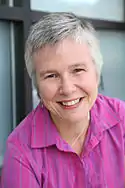Sharon F. Terry | |
|---|---|
 | |
| Born | November 16, 1956 Waterbury, Connecticut, U.S. |
| Education | State University of New York at Stony Brook, Assumption College |
| Occupation | health care advocate |
| Spouse(s) | Patrick F. Terry, m.1986 d.2019 |
| Children | 2 |
| Parents |
|
| Awards |
|
| Website | sharonfterry.com |
Sharon F. Terry (born November 16, 1956, in Waterbury, Connecticut) is a health advocate in San Diego, California, United States. She co-founded PXE International when her children were diagnosed with pseudoxanthoma elasticum (PXE) in 1994.[1] Her TEDMED talk[2] from 2017 has been viewed more than a million times, and was the subject of the TED Radio Hour.[3] In 2009, she was elected an Ashoka Fellow[4] for her entrepreneurial work in engagement and the development of interventions for genetic conditions.
Professional background
She is the current President and CEO of Genetic Alliance,[5] and Executive Director of PXE International,[6] a research organization for the genetic disorder pseudoxanthoma elasticum (PXE).
She is co-founder of the Genetic Alliance Registry and Biobank.[7] She is the chair of the Coalition for Genetic Fairness that advocated for the passage of the Genetic Information Nondiscrimination Act.[8]
She also served on the inaugural Advisory Panel for the Precision Medicine Initiative,[9] is the chair of the National Academy of Medicine Board on Health Sciences Policy [10] and many other health and research related organizations.
In 2005, Terry received an honorary doctorate from Iona College for her work in community engagement and haplotype mapping, and in 2007 received the first Patient Service Award from the UNC Institute for Pharmacogenomics and Individualized Therapy.[11] She also accepted the Paul G. Rogers Distinguished Advocacy Organization Award from Research!America in 2009.[12] In 2012, she received the Spirit of Empowerment Advocacy Award, Facing Our Risk of Cancer Empowered,[13] and was given an Honorary Professorship, at Hebei United University, Tangshan, China. In 2013, she was named one of the Food and Drug Administration's Rare Disease Heroes.[14] In 2016 she was named a National Association of the National Research Council,[15] and received the Health 2.0 Activist Award.[16] In 2019, she received the Luminary Award from the Precision Medicine World Conference.[17] In 2021, she received the Advocacy Award from the American Society of Human Genetics.[18]
She also serves as the President of Schola Ministries, a nonprofit dedicated to producing the music of Kathleen Deignan.[19]
Her work includes novel data-sharing projects such as Registries for All,[7] winner of the Transforming Health Systems Ashoka Changemakers Award.[20][21] She served on the Institute of Medicine Committee on the Necessity of Use of Chimpanzees in Biomedical and Behavioral Research[22] and the IOM Committee on a Review of the California Institute for Regenerative Medicine.[23] She was the co-chair of the National Academy of Medicine's Roundtable on Genomics and Precision Medicine.[24]
References
- ↑ Kolata, Gina (2000-05-23). "A Family's Goal Is Met And a Gene Is Found". The New York Times. ISSN 0362-4331. Retrieved 2019-08-14.
- ↑ Terry, Sharon (15 June 2017), Science didn't understand my kids' rare disease until I decided to study it, retrieved 2019-08-14
- ↑ "Sharon Terry: When Siblings Get A Rare Diagnosis, Can Their Parents Find the Cure?". NPR.org. Retrieved 2019-08-14.
- ↑ "Home | Ashoka | Everyone a Changemaker".
- ↑ "Sharon Terry". Genetic Alliance. Retrieved 2011-03-05.
- ↑ "Home". pxe.org.
- 1 2 "Innovator: Sharon Terry's Global Database for Disease Research". Bloomberg.com. 21 March 2013. Retrieved 2019-08-14.
- ↑ "All About the Genetic Information Non-Discrimination Act of 2008 (GINA)". Genome.gov. Retrieved 2011-03-05.
- ↑ "Sharon Terry, M.A. | National Institutes of Health (NIH)". www.nih.gov. Archived from the original on 2015-12-23.
- ↑ "Board on Health Sciences Policy - Institute of Medicine". Archived from the original on 2010-01-14. Retrieved 2013-08-08.
- ↑ "IPIT Good". Ipit.unc.edu. Archived from the original on 2011-07-20. Retrieved 2011-03-05.
- ↑ "Genetic Alliance Honored with Research!America Advocacy Award". 24 March 2009.
- ↑ "FORCE Conference: Annual Awards". www.facingourrisk.org. Retrieved 2019-08-14.
- ↑ "Profiles of Rare Disease Heroes". www.fda.gov. Archived from the original on 2013-08-13.
- ↑ Associates nationalacademies.org
- ↑ "Health 2.0 Unveils Top 10 Finalists from Global Retrospective Awards". www.prnewswire.com. Retrieved 13 December 2023.
- ↑ "The Artificial Patient: Scientists and AI Moving Closer to This Goal to Speed Successful Drug Development; Topic is Among Scintillating Subjects Discussed at Virtual Precision Medicine World Conference (PMWC) (June 14–18)". 16 June 2021.
- ↑ "ASHG". 12 July 2021.
- ↑ "About". Schola Ministries. Retrieved 2011-03-05.
- ↑ "1st Place Winner! Registries for ALL: Reg4ALL".
- ↑ "Home". reg4all.org.
- ↑ Fischman, Josh (2011-12-15). "Chimp Research Is Sharply Curbed After Critical Report to NIH". The Chronicle of Higher Education. ISSN 0009-5982. Retrieved 2019-08-14.
- ↑ "Review of the California Institute for Regenerative Medicine - Institute of Medicine". Archived from the original on 2011-08-15. Retrieved 2012-01-25.
- ↑ Genomic Based Research nationalacademies.org